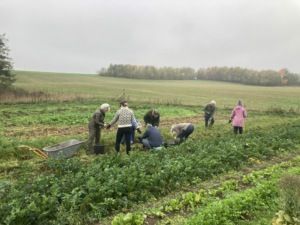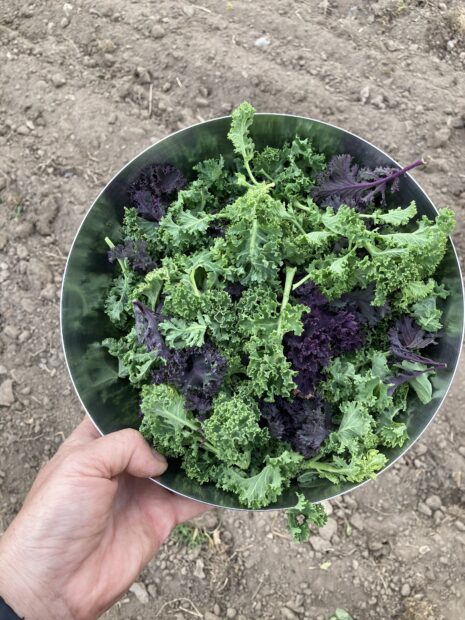News
Duemosegaard – a farm where ideas are grown
This article is more than 2 years old.
Just north of Greater Copenhagen lies an old farmstead where Ross and Heather Jackson are raising food in a regenerative way

In between Farum and Birkerød, in the rolling countryside just north of Greater Copenhagen, lies an old farmstead from 1895, home to Ross and Heather Jackson. Any comparison to a conventional farm stops there, as within the whitewashed walls of the house, and in the compost heap and converted farm buildings, seeds of ideas are raised, nourished and brought to fruition.
SPOR – art exhibition
The latest venture for Duemosegaard (Dove Lake Farm) is an art exhibition in spacious white rooms looking out across brittle winter fields and hedgerows. Christina Bardram (painting) and Finn Dam Rasmussen (ceramics) are currently showing their artwork in an exhibition called ‘SPOR’. The title of the exhibition refers to the indistinct remnants of things past that both artists imbue in their work – the surface markings and clues that the viewer can interpret in a hundred ways, but which can equally offer themselves as minimalistic contemplations in form, texture and colour. Both are professional artists with a following in Denmark and abroad. Bardram is this time exhibiting both her minimalistic oil paintings and detailed watercolours, Rasmussen his very sculptural ceramics, which are also favoured by Noma restaurant. The gallery at Duemosegaard is open Wednesday to Sunday from 11:00-16:00 until February 17. Or by arrangement, contact the gallery via duemosegaard@gmail.com or 5150 3099.
Taste of Life
The owners of Duemosegaard have a strong connection with these meditative, confident artworks with their homage to the past and vision for the future. I visited unannounced during regular opening hours and was greeted warmly by Heather Jackson, who’s in charge of the elegant exhibition spaces and marketing at Duemosegaard. Originally from the UK, having previously worked as an artist and designer in Paris, our host and her dog showed me knowledgeably around the artworks, then plied me with a staggeringly good organic apple cake (her third publication, a vegetarian cookbook provisionally titled ’A Year at Duemosegaard’, is underway!) and explained a little more about the background of this unusual place. The dog led the way and we walked the frozen earth, inspecting the 19 hectares dedicated to regenerative living, remarkable vegetables and visions for a better future for the planet.
Reign of ’Terroir’
Agriculture occupies more than 60 percent of Denmark’s area. Biodiversity is under threat and resource consumption is among the highest in the world. Back in the 1970s, just taking a drive through the blossoming Danish countryside in summer would leave the windscreen splatted by insects. Nowadays, the glass is clean. All is sterile, the food chain shattered by overfarming and the overuse of pesticides. For twelve years, 4,000 sqm of the farmland at Duemosegaard has been dedicated to Fælles Grønt (communal gardens), where 25 local families have been invited to participate in the planning, enriching, planting, tending and the harvesting of ’biodynamic’ produce. Biodynamic farming follows the teachings of Rudolf Steiner and his organic theories on the wonders of manure, the Moon, no pesticides and a dash of hocus pocus. The fruits, vegetables and fellowship raised on the (now) terrific soil have much more intense flavours, textures and colours than conventionally farmed produce. Although the vegetable gardens look rather ’cabbagy’ in late January, we inspected the wonders of the darkened root cellar, with boxes neatly piled with potatoes, celeriac, beetroot, pumpkins, more cabbages, parsnips and – love. The families who till the soil with Ross and Heather Jackson are an eclectic and hearty bunch who enjoy working alongside each other and raising food in a regenerative way. At present there is space for four new members (including their families) to the group – the only requirement is that 40 hours of work are made in the fields or barn across the year and a fee of 1,800 kroner is paid towards seed, equipment and plants. Plans are also afoot to create more biodiversity and natural habitat on the rest of the land for local wildlife, and to begin farming the land using ’No Plough’ and ’Forest Gardening’ principles.
Grassroots
The roots of this eco-friendly place were firmly planted in the 1980s by Ross Jackson and his former wife Hildur with the foundation of the Global Ecovillage Network (GEN). Jackson was ahead of his time in recognising the fragile state of our denuded planet, and the need to tend to the earth itself instead of the headlong dash into a world poisoned by the toxic capitalist attitude of progress at all costs – especially regarding the natural world. GEN nowadays is an information network using educational programs, newsletters and knowledge disseminated amongst the thousands of projects across the world that are building and living in small intentional communities in harmony with nature.

Eco-nomics
An economist and successful businessman, physicist by training and Canadian by birth, Jackson co-founded Simcorp, which is today a leading global financial software company. He was also the major shareholder in Urtekram, Scandinavia’s largest organic food wholesaler. From the 1980s onwards, Jackson dedicated a large amount of his time, colossal intellect and organisational skills towards putting structure into GEN and its sister organisation Gaia Education via Gaia Trust, a Danish-based charitable entity formed in 1987 to promote a more sustainable world. These days, Jackson is writing his seventh book while his wife breathes life into the old farm buildings. The book is nearing completion and focuses on the future of the world economy and the need to urgently make amends for the failures of economics in dealing with climate change and inequality.
Out of the Box and into a War Zone
GEN truly came into its stride during the Russian invasion of Ukraine, when ecovillages across Europe rallied to assist displaced refugees fleeing from destruction. As conventional aid agencies waited at closed borders, the Ukrainian network of ecovillages rallied in conjunction with their European colleagues and provided badly needed food, shelter and medical supplies within three days. Last year Duemosegaard Samtalerene (the Duemosegaard Conversations – a series of talks held at the farm by movers and shakers in sustainability and environmentalism) hosted a vivid presentation by some young Ukrainian volunteers who have been active in organising and distributing supplies and expertise to their war-torn homeland using the proactive networks and initiatives of ecovillagers in Ukraine and across Europe, the bottom line being that the free-thinkers who inhabit ecovillages have never lived in boxes. When disaster strikes, it’s these kinds of people who take the lead.
Love and Peace
Ross and Heather Jackson make a lovely couple, and just last summer got married by one of the smaller lakes on the farm surrounded by friends, family and supporters from all over the world and from all walks of life. Though of different ages and backgrounds, these two are united in protecting and nurturing the SPOR – the traces of the natural world through art, economics and regenerative living. As I walked away from the farm on that cold January day past the rows of kale and last years’ sunflowers, I felt a sense of hope rising that there could be a way forward for the planet through action and the implementation of a more thoughtful way of being.
Go visit; go get inspired!











































